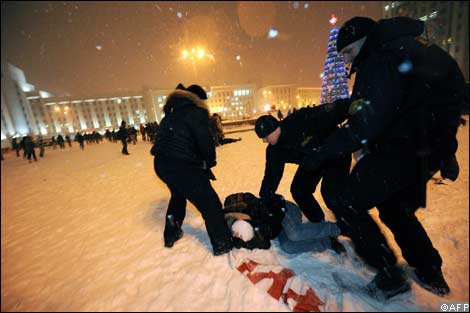Tech vs. the Many Tools of Control

Belarus' people went to the polls December 19. It didn't go well, as Alexander Lukashenko's implausible 80% victory added to a string of really grim elections of late. The OSCE statement noted "observers assessing almost half of vote counts monitored as bad or very bad". NDI's partner organizations were on the ground, watching it - but their tech-enabled reporting system had been crippled. A couple months back I traveled to the region to work with some of our Belarusian partners as they prepared to peacefully monitor the elections. One major component of the effort was using SMS to try to get numbers back as fast as possible for analysis. NDI does a lot of election observation; we've written the book (several of them, really) on the topic.
To hold a regime accountable for the what the people actually voted is hard, but it boils down to collecting numbers and checking the government's math. For example, if you know that 200 people were registered at a location but 400 voted, or if 1000 people were said to have voted at the close of polls but the next morning that number had changed to 1200 you can call shenanigans Jared has written up one example of a more typical SMS reporting system to collect election data, but given the heavy-handed grip of the regime some of our typical techniques wouldn't work. (Fun trivia: they never bothered renaming their state security service from "KGB".) So we opted for a more flexible, lightweight approach using FrontlineSMS. As I've described, Frontline uses normal phone numbers and standard laptops. We hoped that we could fly under the radar and the government would leave us alone. No such luck. Shortly after going live, the number being used for Frontline was shut down. A call to the telecom provider didn't provide an explanation - but did warn them that any other numbers used would be shut down, too. Our best guess is that someone on the inside was providing information to the regime to keep our observer communication systems offline. The best technology in the world can't stop that sort of infiltration. We had anticipated this threat and the observers were able to fall back to more traditional, if slower, methods of communication, and our observers were able to continue their work over other communications systems.
You've always got to have contingency plans when working in closed societies. The Belarusian internet police were busy that day; Hal Roberts from the Berkman Center has a blow-by-blow writeup of the efforts of regime ISPs to redirect traffic to clones of opposition sites. Reactionary authoritarians are learning from the march of technology, as demonstrated by the rapid shutdown of our SMS system and the clever manipulation of opposition web sites. So are human rights defenders - we've learned lessons for next time.
